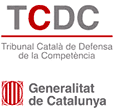|
Submission date: June 2004
Published in: December 2004 |

|
|
Conference on Competition and ICT
ICT and competition. Presentation of the study
| |||
|
 With the support of:  |
||
 This paper presents the study commissioned by the Catalan Antitrust Tribunal carried out by a group of experts looking into the effects of competition on the information and communication technologies. The framework studied is the digital economy from a global perspective, an economy that differs in many ways from the traditional economy, both in terms of the complexity of the relations between the agents involved and the appearance of new relations, situations and concepts, such as lock-in or information cartels. One of the differentiating traits of this new global market with local jurisdiction is the possibility of achieving perfect competition. However, due to the network being scale-free, the market ends up being dominated by a very small group of companies.  competition, internet, ICT, digital economy, lock-in
|